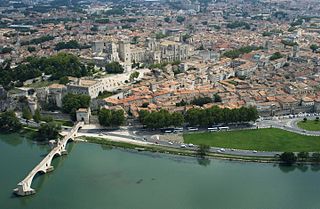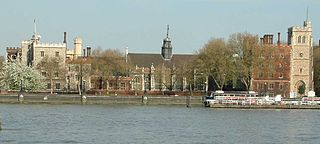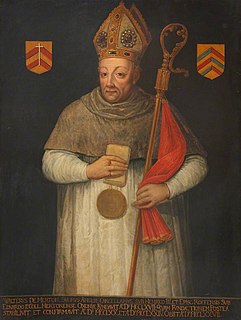Related Research Articles

Avignon is the prefecture of the Vaucluse department in the Provence-Alpes-Côte d'Azur region of Southeastern France. Located on the left bank of the river Rhône, the commune had a population of 93,671 as of the census results of 2017, with about 16,000 living in the ancient town centre enclosed by its medieval ramparts.

Boniface of Savoy was a medieval Bishop of Belley in Savoy and Archbishop of Canterbury in England. He was the son of Thomas, Count of Savoy, and owed his initial ecclesiastical posts to his father. Other members of his family were also clergymen, and a brother succeeded his father as count. One niece was married to King Henry III of England and another was married to King Louis IX of France. It was Henry who secured Boniface's election as Archbishop, and throughout his tenure of that office he spent much time on the continent. He clashed with his bishops, with his nephew-by-marriage, and with the papacy, but managed to eliminate the archiepiscopal debt which he had inherited on taking office. During Simon de Montfort's struggle with King Henry, Boniface initially helped Montfort's cause, but later supported the king. After his death in Savoy, his tomb became the object of a cult, and he was eventually beatified in 1839.

Walter de Merton was Lord Chancellor of England, Archdeacon of Bath, founder of Merton College, Oxford, and Bishop of Rochester. For the first two years of the reign of Edward I he was - in all but name - Regent of England during the King's absence abroad. He died in 1277 after falling from his horse, and is buried in Rochester Cathedral.

A papal conclave is a gathering of the College of Cardinals convened to elect a bishop of Rome, also known as the pope. The pope is considered by Catholics to be the apostolic successor of Saint Peter and earthly head of the Catholic Church.

Castres is a commune, and arrondissement capital in the Tarn department and Occitanie region in southern France. It lies in the former French province of Languedoc.
Nicholas of Ely was Lord Chancellor of England, Bishop of Worcester, Bishop of Winchester, and Lord High Treasurer in the 13th century.

Pedro Martínez de Luna y Pérez de Gotor, known as el Papa Luna in Spanish and Pope Luna in English, was an Aragonese nobleman, who as Benedict XIII, is considered an antipope by the Catholic Church.
The Council of Agde was a regional synod held in September 506 at Agatha or Agde, on the Mediterranean coast east of Narbonne, in the Septimania region of the Visigothic Kingdom, with the permission of the Visigothic King Alaric II.
The Roman Catholic Council of Albi was held in 1254 by St. Louis on his return from his unlucky Crusade, under the presidency of Zoen, Bishop of Avignon and Papal Legate for the final repression of the Albigenses, the reformation of clergy and people and the Church's relation to the Jewish people.

The Roman Catholic Diocese of Fréjus–Toulon is a diocese of the Latin Rite of the Roman Catholic Church in southeastern France on the Mediterranean coast. In 1957 it was renamed as the Diocese of Fréjus–Toulon.
Herbert Poore or Poor (died 1217) was a medieval English clergyman who held the post of Bishop of Salisbury during the reigns of Richard I and John.
Gilbert Glanvill or Gilbert de Glanville was a medieval Bishop of Rochester.

The Roman Catholic Archdiocese of Albi (–Castres–Lavaur), usually referred to simply as the Archdiocese of Albi, is a non-metropolitan archdiocese of the Latin Rite of the Catholic Church in southern France. The archdiocese comprises the whole of the department of Tarn, and has itself been suffragan, since the 2002 provinces reform, to the Archdiocese of Toulouse, a metropolitan archdiocese.
Thomas de Buittle [Butil, Butill, Butyll, Butyl, Bucyl] was a Scottish prelate, clerk and papal auditor active in the late 14th and early 15th centuries. Probably originating in Galloway, Scotland, Thomas took a university career in canon law in England and France, before taking up service at the court of Avignon Pope Benedict XIII. He obtained a number of benefices in the meantime, including the position of Archdeacon of Galloway, and is the earliest known and probably first provost of the collegiate church of Maybole. The height of his career came however when the Pope provided him to the bishopric of Galloway, a position he held from 1415 until his death sometime between 1420 and 1422.

The Roman Catholic Archdiocese of Avignon is an archdiocese of the Latin Rite of the Roman Catholic Church in France. The diocese exercises jurisdiction over the territory embraced by the department of Vaucluse, in the Region of Provence-Alpes-Côte d'Azur. The diocese has been led since January 2021 by Archbishop Georges Pontier, whom Pope Francis called out of retirement to serve as Apostolic Administrator.
Bertrand des Bordes was a bishop of the Diocese of Albi and Roman Catholic Cardinal. He served as Chamberlain of Pope Clement V from 1307 to 1311.

Perugia was a long-time papal residence during the 13th century. Five popes were elected here: Pope Honorius III (1216–1227), Pope Clement IV (1265–1268), Pope Honorius IV (1285–1287), Pope Celestine V (1294), and Pope Clement V (1305–1314). These elections took place in the Palazzo delle Canoniche adjoining the Perugia Cathedral.

Bernard Délicieux was a Spiritual Franciscan friar who resisted the Inquisition in Carcassonne and Languedoc region of southern France.

Bernard d'Albi, was born at Saverdun in the diocese of Pamiers in the Pyrenees foothills, south of Toulouse, and died on 23 November 1350 at Avignon. He was a French cardinal of the 14th century.

The following is a history of Avignon, France.
References
- Léon-Honoré Labande (1908), Avignon au 13eme siecle : l'eveque Zoen Tencarari et les Avignonnais